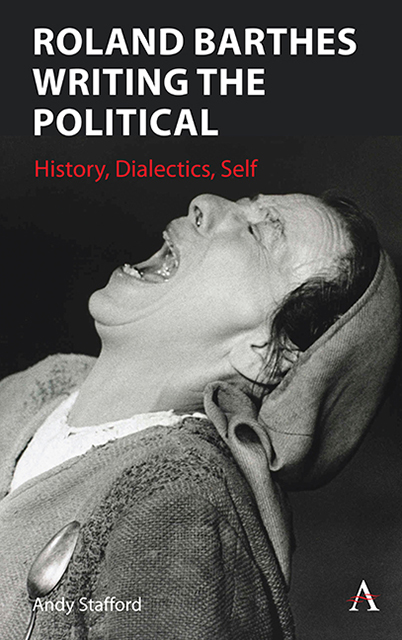Book contents
- Frontmatter
- Contents
- Acknowledgements
- Foreword
- Chapter One ‘The Dialectical Logic of Love’
- Chapter Two ‘Amorous Dialectic’
- Chapter Three ‘The People Chorus’
- Chapter Four ‘Double Grasp’
- Chapter Five ‘Stereographic Space’
- Chapter Six ‘Non-Classifiable’
- Chapter Seven ‘New Dialectic’
- Chapter Eight ‘Opacity’
- Chapter Nine ‘Undialectics’
- Afterword: Essayism and the Politics of Writing
- Bibliography
- Index
Afterword: Essayism and the Politics of Writing
Published online by Cambridge University Press: 08 June 2023
- Frontmatter
- Contents
- Acknowledgements
- Foreword
- Chapter One ‘The Dialectical Logic of Love’
- Chapter Two ‘Amorous Dialectic’
- Chapter Three ‘The People Chorus’
- Chapter Four ‘Double Grasp’
- Chapter Five ‘Stereographic Space’
- Chapter Six ‘Non-Classifiable’
- Chapter Seven ‘New Dialectic’
- Chapter Eight ‘Opacity’
- Chapter Nine ‘Undialectics’
- Afterword: Essayism and the Politics of Writing
- Bibliography
- Index
Summary
Every author has a sense in which all the contradictory passages are harmonized, otherwise that author has no sense […]. One must therefore find a sense in which all the contradictions are reconciled.
(Blaise Pascal cited in Losurdo 2020, viii)It seems perhaps odd, in the light of what has gone before in this book, to conclude, to close down the discussion. Perhaps then a contradiction is needed. Barthes, probably not a Barthesian (Stafford 2015a, 156–59), is very possibly a materialist moralist; that is, deeply conscious of the lived realities of alienated modern human society, which are then turned into writerly, literary essayism. Furthermore, there is no ‘double’ Barthes divided between aesthetics on the one hand, and the political on the other hand. Indeed, it is against the spirit of Barthesian theory and writing to divide them. Though there are clearly different Barthesian constituencies, the political and the aesthetic are not separate, merely nuances, accents and emphasis. Perhaps it is the ultimate essayistic feature – moralism – that keeps them tightly tied, at least in Barthes's world and spirit. It is necessary then finally to make some tentative suggestions as to the nature of the ethics and politics of Barthesian essayism. This will be carried out by way of a triangulation with, first, an intellectual figure whom we have regularly discussed in this book, Lucien Goldmann, and second, an essayist heavily influenced in his early career by Goldmann and Barthes, the Palestinian post-colonial critic Edward Said.
Barthes, Said, Goldmann
The [person] interested in these disciplines [psychology, socialist moral or religion in the novel] will read essays and risk less.
(Robbe-Grillet 1965, 35, trans. mod.)Barthesian ethics in the 1970s have clear echoes in Edward Said's anti-imperialism, what in Orientalism is called the ‘nonrepressive’ and ‘non-manipulative’. Both Said and Barthes wrote, to lesser and greater extents – and this will be the nub of this comparison – as consummate essayists, who, both playful and acerbic in their commentaries, were ever keen to negotiate the dichotomies of writing and reading, of modernity and classicism (in music as much as in literature), of self and other in relation to an alienated political world. However, Higgins (1981) sees Barthes escaping the Saidian dichotomy of either not speaking, or denying subjectivity, by ‘writing without representing’.
- Type
- Chapter
- Information
- Roland Barthes Writing the PoliticalHistory, Dialectics, Self, pp. 219 - 226Publisher: Anthem PressPrint publication year: 2022



